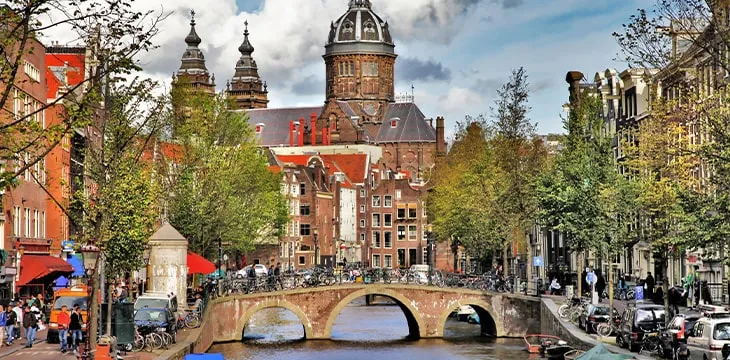|
Getting your Trinity Audio player ready...
|
To many, Amsterdam is a place that caters to people’s vices: smoking pot, strolling around a fully-lit district with sex workers standing in red-lighted booths, live sex shows, nightlife, and other wild activities. But alongside these nightlife shenanigans and the bicyclists who rule over all paved surfaces, Amsterdam is among the top 10 digital currency-friendly cities in the world.
The Bitcoin Boulevard
In 2014, 10 merchants located along one of the canals decided to accept Bitcoin as the mode of payment from their customers. Their street became known as The Bitcoin Boulevard in the Hague, a suburb of Amsterdam. Nearly all shops, vendors, and merchants on this street accepted Bitcoin as payment.
I wasn’t able to personally visit the boulevard, but its mere existence made me want to learn more about it as well as Amsterdam’s role in the growing acceptance of Bitcoin.
I learned that in 2013, the Netherlands’ 10th biggest online retailer, Thuisbezorgd.nl, a brand owned by the European food delivery site takeaway.com, started accepting payments in Bitcoin. The company has around 5,000 restaurants for which they take care of the order processing and payment.
Thuisbezorgd also sponsored The Bitcoin City in Arnhem, an initiative that aimed to onboard more merchants to accept bitcoins as payment.
Bitcoin ATMs in Amsterdam
My recent visit to the land of the Dutch offered me a great insight into the current state of ‘crypto’ affairs. First and foremost, there is a Bitcoin ATM at the Amsterdam Schiphol Airport where travelers can exchange their leftover Euros for digital currencies. Set up in 2018, it is the first European airport to offer this type of service.
The city has at least 20 digital currenncy ATMs and over 40 vendors that accept digital currencies as payment. However, things have changed globally since 2014, and various countries have been discussing regulations for digital currency to curb and avoid malpractices.
At the time of establishment, Amsterdam Airport Schiphol Director of consumer products & services Tanja Dik, said: “Schiphol is constantly looking for ways to innovate and provide optimum service to passengers. With the Bitcoin ATM, we hope to provide a useful service to passengers by allowing them to easily exchange ‘local’ euros for the ‘global’ cryptocurrencies Bitcoin and Ethereum. That can be beneficial if, for instance, it’s not possible to spend euros in their home country.”
Bikes and Bitcoin!
The Netherlands certainly seemed to be one of the premier bitcoin hotspots in Europe, according to my online research. Arnhem, another city in the Netherlands, is the Bitcoin City in all of Europe and maybe the world.
Of course, it wouldn’t be The Netherlands without bicycles, so I set out to discover a bicycle rental shop that accepted Bitcoin. I didn’t ride a bicycle there because my brain froze each time I came across these unstoppable bikers zooping through all lanes, including pedestrians’ zebra crossing, which made me dearly miss my second home—the U.S. in an indescribable way where pedestrians are glorified, protected, and placed on a pedestal. Thanks to the lawsuits, but I’ll take it!
Still, I wanted to discover whether bicycle rentals in Amsterdam accept Bitcoin or other digital currencies as payment. I am disappointed to report that Starbikes Rental, one of the biggest bicycle rental companies in Amsterdam, no longer accepts Bitcoin as payment as opposed to what their website claims. It did accept Bitcoin, though, in 2013-2014. The digital currency then had the entire transportation covered in the Netherlands as visitors/residents could rent a bike and take it with them from city to city.
Bitcoin and restaurants
A famous lunch and dinner spot, the Magere Brug cafe, and a sought-after coffeeshop, The Bulldog, didn’t disappoint as it didn’t seem too difficult to find out that it’s possible to buy food and brownies with digital currency in Amsterdam. And hence, the voice inside my head echoed: “After all what people say about Europe, is perhaps true. Europe is chill and very flexible in financial terms.”
The restaurant I ate at did accept BTC using the point-of-sale terminal by BitKassa, the same payment processor running the entire Arnhem’s digital currency-accepting venues. Customers can pay through the Lightning Network or directly on-chain but unfortunately they did not offer the original Bitcoin.
I asked a waiter at a cafe in Amsterdam if she finds it difficult to accept digital currency payments. “Not particularly. It is the new thing, so I have to learn it sometime. These type of transactions take place frequently as the authorities come in to monitor these on a regular basis.” she answered with an audible reluctance in her voice.
Faintly but clearly, it conveyed the message to me that the Dutch, and maybe all Europeans, are pretty accepting of digital currencies, unlike how it is back home in the United States. It seemed to me that the concept of a digital financial system [economy] was embraced and understood more rationally and openly in the Netherlands.
When I asked Aneesh A., a software manager in Amsterdam, why the digital currency industry looks relatively more free-flowing and committed there, he said:
“This culture has always been very technology friendly although in its own granular and a Sci-fi kind of way. We aren’t like the formal, uptight, aristocratic kind of technologists here in Amsterdam.”
Is Amsterdam past its early Bitcoin hayday?
“I certainly don’t think so,” Aneesh told CoinGeek, adding that it is still quite crypto-friendly and quite a lot of people are investing in digital currencies. He pointed out that several webshops are now accepting digital currency as payment, and they seem quite comfortable with the setup. Some businesses even offer clients an option to choose which digital currency they like to pay with, as most entrepreneurs accept at least two or three different digital currencies.
Personally, I found it challenging to use my credit card at most stores and shops in the Netherlands, as the country seems to prefer local debit cards. I learned that not only businesses don’t opt for foreign credit cards, but also credit cards from the Netherlands itself. On the other hand, some businesses happily accept digital currency, alongside cash and debit cards.
The coming years will tell whether Amsterdam retains its place among the top 10 digital currency-friendly cities in the world or bags the top spot to remain there forever.
Watch: The BSV Global Blockchain Convention presentation, BSV On-chain Ecosystem Development in Europe

 07-04-2025
07-04-2025 





